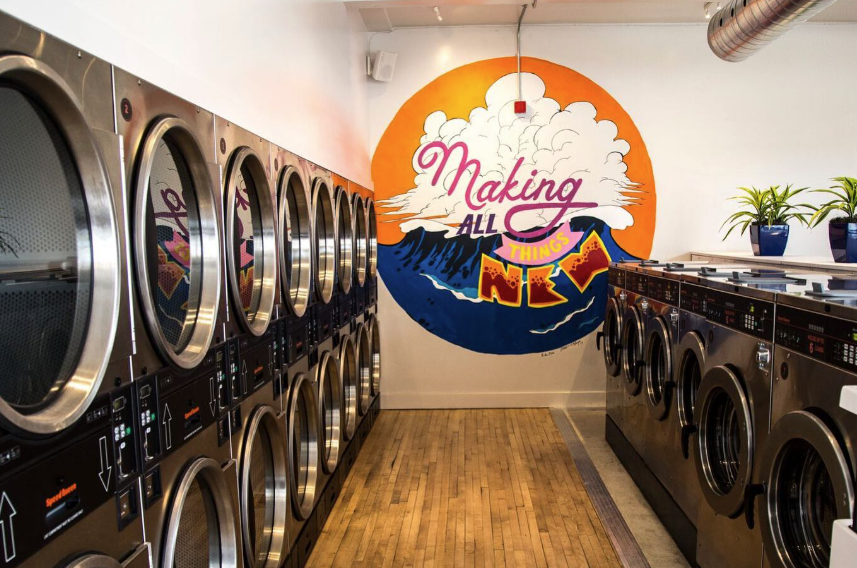Coffee, Clean Clothes, and Community
Coffee, Clean Clothes, and Community
By Ray Marcano
A Detroit church has created a community haven where visitors can not only find spiritual support and connection, but can clean their clothes, too.
Back in 2018, Mack Avenue Community Church opened The Commons, a laundromat and coffee shop. It gave the neighborhood “a space to congregate, to meet, to connect, to cross paths, to hang out, to engage with each other,” church pastor Leon Stevenson, said.
On its face, combining a laundromat and coffee shop under one roof might seem an odd pairing, like putting pickles on a peanut butter and jelly sandwich. The project came together after the church met with community members to learn how it could help the struggling area. The church learned that people needed a place to wash their clothes.
“Our vision is to see communities transformed, both physically and spiritually, starting right here with our own,” Stevenson said. “So, on the spiritual side, the church is excited to invest in people and lead with discipleship and see people grow in Christ.”
Investing in Detroit’s zip code 48214 meets the church’s vision of helping neighborhoods flourish. Nearly 30 percent of local residents live below the poverty line.
Moreover, The Commons is located 1.3 miles east of the church in an area that needs support. The laundromat/coffee shop sits across the street from a vacant lot and a mini-mart. Some houses are boarded up, others in drastic need of repair. Crime is also a problem, as the zip code is one of the more dangerous in the country, according to Crimegrade.org.
Eight years prior to opening The Commons, the church started a nonprofit for community development and other initiatives like an after-school program, legal clinic and sports program.
But The Commons was a massive undertaking. Through philanthropy and grants, the nonprofit raised $1.4 million to purchase a vacant building, renovate it, and buy laundromat equipment.
Stevenson’s board and small congregation of 90 people back the project. But the wider church community that had partnered with Mark Avenue on other projects was more reserved, and that hurt.
“They were like, good idea, but let’s see how that goes. Get back to us when you get halfway through it,” Stevenson said. He had the financial resources to complete the project, but wanted more spiritual support to carry him through times of doubt.
“I think that we all want to be affirmed,” he said. “We want to know that this risk we’re taking is worth it. Knowing that people are behind you and believe in you and are praying for you, really can make the difference.”
The area provides a challenge and risk for The Commons. Some have tried to steal the tip jar. Others have come in angry, broken things in the store and accosted staff. Stevenson is amazed that when these things happen, customers take action, as if to say, “No. Not here.”
“Our customers have jumped behind the coffee bar to make sure our people were safe,” Stevenson said. “You don’t do that unless it’s a place you care about. You don’t give of yourself unless you felt other people love and care for you. That’s what gets me emotional sometimes, thinking that people would fight for this place in that way.”
The Commons is priced with the community in mind. A cup of coffee costs $1.89, and a breakfast sandwich is $3. A small load of laundry costs $3.50 to wash and $0.25 to dry. You can even buy laundry detergent ($0.50 for a half cup, $1 for a full cup).
It’s a big undertaking that has paid off for a neighborhood that needs it. Everything — the building’s location, its services, and its perseverance in the face of poverty — fits into the Mack Avenue Community Church’s philosophy.
Stevenson said, ‘What we hope you say about our church is that because they exist, my quality of life is better.”
This story is part of Lake Institute’s story collection, the Faithful Generosity Story Shelf, which highlights congregations and other religious organizations who have sought to use their assets and resources in creative—and sometimes surprising—ways as an expression of faithful giving.
Each entry in our Story Shelf is short enough to be read and discussed during a committee meeting or other group gathering. Our hope is that these accessible vignettes will spark new questions, conversation, and imagination among clergy and laity about what might be possible with the funds, buildings, land, and other resources in their care. If you know a story that should be included in the Story Shelf, suggest it here.
Subscribe
Insights is a bi-weekly e-newsletter for the religious community and fundraisers of faith-based organizations that provides:
- Reflections on important developments in the field of faith and giving
- Recommended books, studies and articles
- Upcoming Lake Institute events

